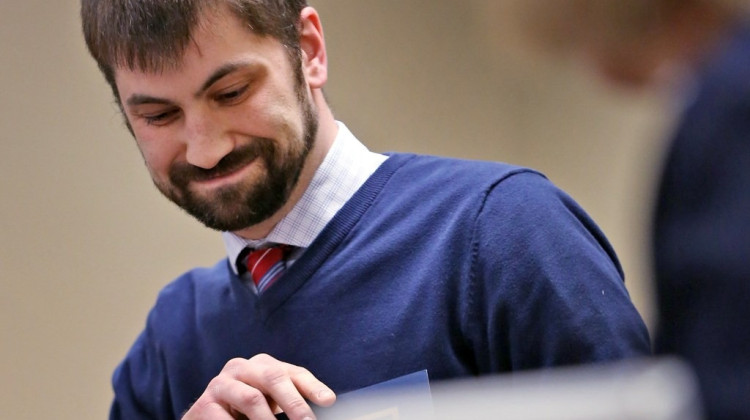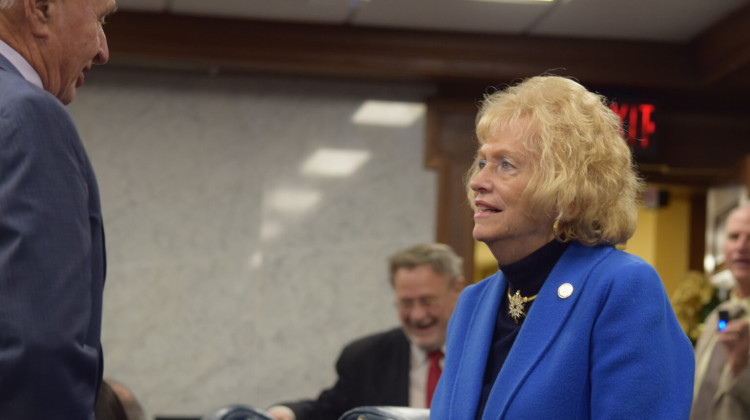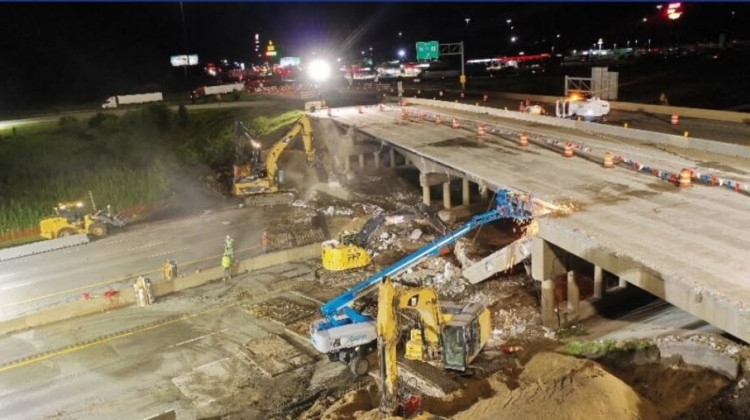
Senator Robert Kennedy shakes hands with the crowd in front of the St. Joseph County Courthouse on Dyngus Day, April 15, 1968. (Courtesy of Michael G. Gotsch Jr.)
Monday is Dyngus Day, a Polish celebration of the end of Lent and, in Northern Indiana, a big deal in political circles.
Fifty years ago South Bend experienced one of it’s biggest Dyngus Day events when Sen. Robert F. Kennedy visited while campaigning for the Indiana Democratic presidential primary.
Indiana was a must-win for Kennedy in 1968. Lyndon Johnson had just announced he would not run and Kennedy was too late for early primaries. Indiana was his first chance to prove he could get votes.
Earl Graves Sr. was an administrative assistant to Kennedy at the time. He gave an oral history to the JFK Presidential Library in 1969.
“They got out into Indiana, which was the first effort, and realized that they still had time to run a registration effort and they still had time to rally persons who did not normally vote in a primary,” Graves said.
The senator from New York spent most of April in Indiana. His first visit to South Bend was on April 4 with speeches at the St. Joseph County Airport and the University of Notre Dame.
Joel Connelly was on the school paper, The Observer, at the time. He remembered Chuck Nau, the head of the student body academic commission introducing Kennedy.
“‘Today I give you the ultimate,’ he said, ‘the next President of the United States.’” Connelly recalled. “And I guess for a college student to introduce somebody that way is a great, great ego rush but Kennedy got a very strong ovation.”
Estimates at the time put the crowd inside Stepan Center that day at about 5,000 with at least 1,000 more left outside.

The crowd inside Stepan Center at Notre Dame April 4, 1968. (University of Notre Dame Archives)
“The place was packed,” 1969 Notre Dame grad John Hickey remembered.“It was, it was just wild, it was a mob scene, and I had the opportunity to sit up on the edge of the stage when he was chatting so I was probably no further than 20 feet from him when he talked.”
“It was electric, it really was,” Hickey said. “Students were pretty progressive back in the day and Kennedy was just the ticket they were looking for.”
Most of those students couldn’t vote though. The voting age in 1968 was 21. Kennedy then went from Notre Dame to the County Home to visit some more senior voters.
Jack Colwell was a political writer for the South Bend Tribune at the time.
“Kennedy was really amazing in his appeal to various groups,” Colwell said. “You would think maybe college kids and people in the old folks home would not necessarily be swayed by the same type of approach.”
But they were, Kennedy drew crowds to the sides of roads when his motorcade came through, at the airport, and at his speeches.
Less than two weeks later, when he came to Dyngus Day, estimates in Colwell’s Tribune articles put the crowd at his speech at the courthouse over 6,000 and the West Side Democratic Club had more than 1,500 inside.
He greeted crowds in English, and brought along his brother-in-law Stanslaw Radziwill, a real Polish prince. (Radziwill’s third wife was Caroline Lee Bouvier Canfield, so the prince was not technically Kennedy’s brother-in-law, but Kennedy referred to him as such).

Kennedy speaks inside the West Side Democratic Club on Dyngus Day, April 15, 1968. (Courtesy of Michael G. Gotsch Jr.)
Kennedy called up Ken Fedder. Who had worked for the U.S. Attorney’s office, and was working for the St. Joseph County Prosecutor at the time.
“He asked me what my thoughts are, since he’s going to be in South Bend, would it be a good idea or would I suggest or would I like to see the prince come and I said well certainly! In fact, he may outscore you!” Fedder remembered.
Radziwill greeted the crowd in Polish and later in the day Kennedy sang the Polish song “Sto Lat” or “May You Live 100 Years.” The Polish prince and Dyngus Day paid off for Kennedy, he carried Polish precincts in the city with more than 60 percent of the vote.
From South Bend he went to Mishawaka, Michigan City, and Gary, crowds along the way pulled Kennedy out of the convertible and onto the pavement where he cut his lip.

The crowd outside the St. Joseph County Courthouse on Dyngus Day. April 15, 1968. (Courtesy of Michael G. Gotsch Jr.)
He got back in and was as enthusiastic as ever. Colwell was in the car with Kennedy that day, he said he was slapped and pushed over and spent most of the ride on the floorboards for safety while Kennedy reached out to shake all the hands thrust his way.
Colwell said he did get an honest moment of doubt from Kennedy during that ride.
“Bobby Kennedy turned to me and he said ‘well, you’ve asked me a lot of questions on these rides, could I ask you one?’ And of course I said ‘well certainly Senator,’" Colwell recalled. "And what he wanted to know was he said ‘can you tell me candidly, do you think I have a chance to win?’”
Kennedy’s message across the campaign was “help me” and “with your help we can turn this country around.”
Some of the issues Kennedy campaigned on -- gun violence, healthcare, poverty, and race relations -- are still issues Americans grapple with today.
Colwell said parallels between 1968 and 2018 are pretty obvious.
“The country is split again, just as it was back then over the war in Vietnam and civil rights and other problems," Colwell said. "I think also the country now, as it was then, is looking for some leader who can unify. At that time they thought it was Kennedy and perhaps he would have been, if he had lived, but of course we’ll never know.”
Kennedy went on to win the Indiana Primary. And several others before being assassinated in Los Angeles on June 5 following a victory speech after the California primary.
Colwell said the reaction was shock. “There were a lot of people, they just, could hardly believe it, as I said that, ‘not again, how could this happen again’ What’s happening to the country? Is everything going to be decided by bullets not ballots? How can we end this,” he said.
Rev. Ted Hesburgh, president of Notre Dame at the time, said in statement, “Robert Kennedy’s service to the nation during the past decade culminating in his tragic death, surely earns for him a patriot’s place in history.”
Colwell’s column on that day read:
“Those who waited that night were here to wave, to cheer or just to look -- not to shoot. But anybody intent on assassination easily could have waited in the dark by any house or any tree or any building. Or he could have gone right out to the curb to shake the candidate’s hand as he fired.”
Kennedy campaigned on a platform of peace and equality. He is remembered in Michiana as a man who came here to ask for help and who shook as many hands as he possibly could.
A special thanks to the University of Notre Dame Archives and the St. Joseph County Public Library's local and family history office for help researching this story. And to the University of Notre Dame Archives and Judge Michael G. Gotsch Jr. for use of photographs in the article.
 DONATE
DONATE






 Support WFYI. We can't do it without you.
Support WFYI. We can't do it without you.